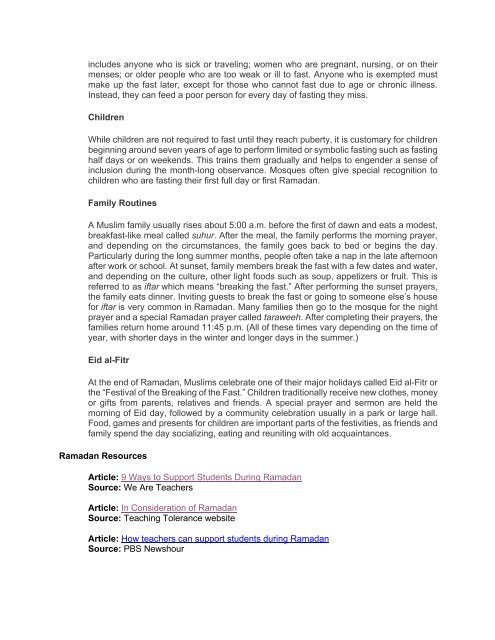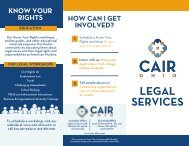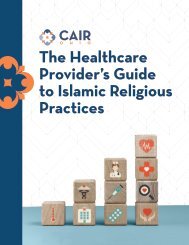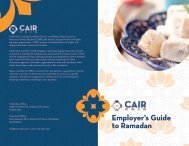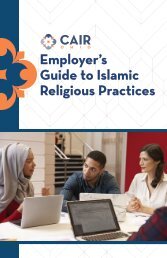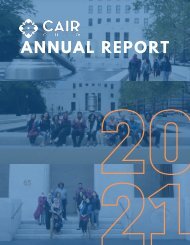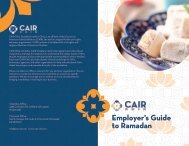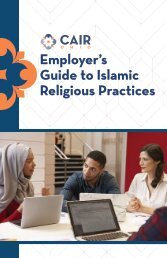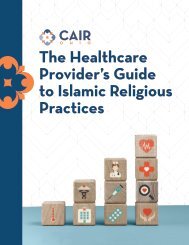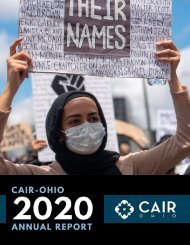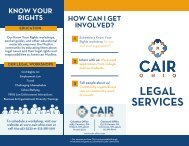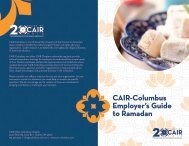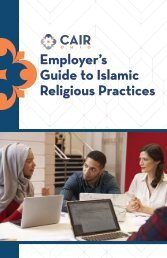Educator's Toolkit
Create successful ePaper yourself
Turn your PDF publications into a flip-book with our unique Google optimized e-Paper software.
includes anyone who is sick or traveling; women who are pregnant, nursing, or on their<br />
menses; or older people who are too weak or ill to fast. Anyone who is exempted must<br />
make up the fast later, except for those who cannot fast due to age or chronic illness.<br />
Instead, they can feed a poor person for every day of fasting they miss.<br />
Children<br />
While children are not required to fast until they reach puberty, it is customary for children<br />
beginning around seven years of age to perform limited or symbolic fasting such as fasting<br />
half days or on weekends. This trains them gradually and helps to engender a sense of<br />
inclusion during the month-long observance. Mosques often give special recognition to<br />
children who are fasting their first full day or first Ramadan.<br />
Family Routines<br />
A Muslim family usually rises about 5:00 a.m. before the first of dawn and eats a modest,<br />
breakfast-like meal called suhur. After the meal, the family performs the morning prayer,<br />
and depending on the circumstances, the family goes back to bed or begins the day.<br />
Particularly during the long summer months, people often take a nap in the late afternoon<br />
after work or school. At sunset, family members break the fast with a few dates and water,<br />
and depending on the culture, other light foods such as soup, appetizers or fruit. This is<br />
referred to as iftar which means “breaking the fast.” After performing the sunset prayers,<br />
the family eats dinner. Inviting guests to break the fast or going to someone else’s house<br />
for iftar is very common in Ramadan. Many families then go to the mosque for the night<br />
prayer and a special Ramadan prayer called taraweeh. After completing their prayers, the<br />
families return home around 11:45 p.m. (All of these times vary depending on the time of<br />
year, with shorter days in the winter and longer days in the summer.)<br />
Eid al-Fitr<br />
At the end of Ramadan, Muslims celebrate one of their major holidays called Eid al-Fitr or<br />
the “Festival of the Breaking of the Fast.” Children traditionally receive new clothes, money<br />
or gifts from parents, relatives and friends. A special prayer and sermon are held the<br />
morning of Eid day, followed by a community celebration usually in a park or large hall.<br />
Food, games and presents for children are important parts of the festivities, as friends and<br />
family spend the day socializing, eating and reuniting with old acquaintances.<br />
Ramadan Resources<br />
Article: 9 Ways to Support Students During Ramadan<br />
Source: We Are Teachers<br />
Article: In Consideration of Ramadan<br />
Source: Teaching Tolerance website<br />
Article: How teachers can support students during Ramadan<br />
Source: PBS Newshour


